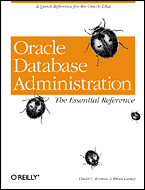

 |
 |

Oracle Database Administration is not your beginner's book on SQL or Oracle. If you want a beginner's book, get the third edition of The Practical SQL Handbook by Judith Bowman, et al. (Addison Wesley, 1998). This is also not an introduction to Oracle database administration. It is a handbook to have nearby if you are an Oracle database administrator (DBA) or are about to become one. Given the release of Oracle8 (covered by this book) for Linux, you may be in danger of the latter. The authors assume you already know more or less what you want to do, and they have made it easy to look up exactly how to do it. They are both Oracle DBAs of long standing, and both are active in Oracle user groups. The authors clearly write from experience.
The book is divided into two sections: the first, DBA Tasks; the second, a reference work for DBAs.
The first part's organization somewhat reflects the life of a database. In their introduction, the authors cover some theoretical ground, which you will find useful. The introduction ends with configuration planning. This section is one you probably won't need very often, but if you are ever in the position of setting up a new database or porting one to a new server, you should read this chapter. There is much good advice on a task you don't do often, but which is essential to making the database work correctly within your budget. The book then covers installation and performance tuning. Again, these two chapters cover things you don't do often, but which are important. Performance tuning is not the same as query optimization, covered in a later chapter.
Following this is a chapter on backups, essential for data integrity. The authors discuss the various types of backups one can do with Oracle or the underlying operating system, their advantages and disadvantages. Step-by-step procedures for several different types of backups and restorations are then given. As the authors say in the chapter, ``The time to plan for recovery is before you need to recover data.'' The authors recommend you walk through several of the backup/restoration procedures to practice and test the ones you will use.
Next are chapters on networking and security. The final chapter covers a number of Oracle tools and has a tantalizingly short section on how to find the many third-party tools for Oracle. Much of the rest of the book consists of reference pages for commands the Oracle DBA will find useful.
When you need more information on Oracle and Oracle administration, refer to the appendix, ``Resources for the DBA''. This covers books, magazines, organizations (and their web sites), newsgroups and list servers. It is an excellent starting point, and in typical WWW fashion, will head you onward from resource to resource.
Finally, the index includes entries for the various Oracle-specific SQL commands and parameters. At a minimum, the index will be very useful for reverse-engineering some of those cryptic SQL statements that inadvertently get left around any database shop.
The language in the book is terse and concise, almost laconic, and very much to the point. On any question, the authors provide rules of thumb or points to consider, but leave the final decision up to the reader. Recommendations are also sprinkled throughout the first part of the book. The authors explain their recommendation, which means the reader learns the ``why'' as well as learning a good practice.
The first edition was printed in April 1999. By June, four errata were posted on the web page, and a second, corrected printing was due by the end of that month. Clearly, O'Reilly takes the professionalism and accuracy of their books seriously. O'Reilly's web site is one of the best around. Looking at a web page for a book is never as good as holding the dead trees in your hands in a bookstore, but O'Reilly's web site comes close. If you are not sure whether this book is for you, check out its entry at the web site. If you are an Oracle DBA or are about to become one, I highly recommend it.
Charles Curley (ccurley@trib.com) has been working with computers for twenty years. His present and former clients include Rockwell International, the Jet Propulsion Lab and Hughes Aircraft. He wrote this review using Emacs and ispell on Red Hat Linux 5.2. No windows were crashed in its production.